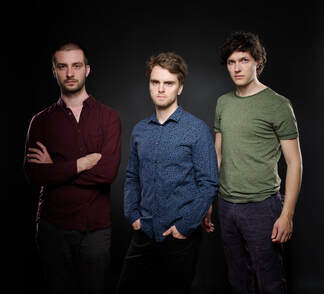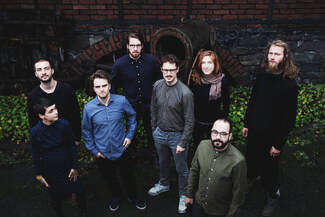Das Eismeer
 photo by Arne Fleischmann
photo by Arne Fleischmann
Die Musik des Trios „Das Eismeer“ hat etwas schwebend Mildes und Entschleunigtes. Sie klingt melancholisch nordisch und nach Weite. Doch wie es schon der treffende Bandname anzeigt, kann auch schroff das Tempo der ausgewogenen Ereignisse angezogen werden. Es ist, als würde sich eine innere Leinwand mehr und mehr mit den bewussten Bildern im Kopf entfalten. Insofern ist das eine Art musikalischer Impressionismus, ausgewogen, leise und doch nachdrücklich. Es zählt der Gruppenklang und nicht das solistische Lospreschen des Einzelnen. Je länger man hört und sich bewusst einlässt auf dieses gleichberechtigte Musizieren, umso mehr gewinnen diese Klänge an Tiefenschärfe.
Ihre markante Soundästhetik beruht auf einem einfühlsamen Zusammenspiel, bei dem jeder dem anderen zuhört und darauf reagiert. Man möchte nicht glauben, dass dieses austarierte Interagieren komplett dem Prinzip Improvisation folgt. Alles entsteht im Moment. Es gibt keine zugrunde liegenden Kompositionen, keine Proben, keine Vorgaben. Was zählt, ist das Jetzt, in dem man sich trifft. Der Hörer ist als Zeuge eines Entstehungsprozesses eingeladen wie zu gemeinsamem Atmen, zu kollektiver Meditation. Alles behält mit seinen Auf- und Abschwüngen Spannung und Elastizität. Es ist schön, ohne glatt zu sein. Und manchmal entstehen dabei regelrecht songartige Strukturen. Ob das Jazz, Rock oder Pop ist, spielt keine Rolle. Wichtig ist nur, dass es nicht in Routine erstarrt. Wie zu einem gemeinsamen Organismus ist das gewachsen, der seine magischen Ideen entwickelt und perfektioniert. Dabei behält diese Kunst ihr Geheimnis. Wenn sie verklungen ist, ist man nicht fertig mit ihr. Bei jedem Hören ersteht sie neu und anders.
PP: guitar
Marius Moritz: piano
Leon Griese: drums
discographie:
Live im Sowieso Neukölln (2020, Slowing Records)
Selftitled (2017, self published on bandcamp)
Ihre markante Soundästhetik beruht auf einem einfühlsamen Zusammenspiel, bei dem jeder dem anderen zuhört und darauf reagiert. Man möchte nicht glauben, dass dieses austarierte Interagieren komplett dem Prinzip Improvisation folgt. Alles entsteht im Moment. Es gibt keine zugrunde liegenden Kompositionen, keine Proben, keine Vorgaben. Was zählt, ist das Jetzt, in dem man sich trifft. Der Hörer ist als Zeuge eines Entstehungsprozesses eingeladen wie zu gemeinsamem Atmen, zu kollektiver Meditation. Alles behält mit seinen Auf- und Abschwüngen Spannung und Elastizität. Es ist schön, ohne glatt zu sein. Und manchmal entstehen dabei regelrecht songartige Strukturen. Ob das Jazz, Rock oder Pop ist, spielt keine Rolle. Wichtig ist nur, dass es nicht in Routine erstarrt. Wie zu einem gemeinsamen Organismus ist das gewachsen, der seine magischen Ideen entwickelt und perfektioniert. Dabei behält diese Kunst ihr Geheimnis. Wenn sie verklungen ist, ist man nicht fertig mit ihr. Bei jedem Hören ersteht sie neu und anders.
PP: guitar
Marius Moritz: piano
Leon Griese: drums
discographie:
Live im Sowieso Neukölln (2020, Slowing Records)
Selftitled (2017, self published on bandcamp)
Peuker8

photo by Dovile Sermokas
Since presenting his first Peuker8 album "Resound" five years ago, Berlin-based Paul Peuker has become recognized as one of the most original voices of a new German jazz. The young guitarist and composer thinks in concepts that are as extraordinary as they are imaginative, and he has been able to keep the same great formation together, establishing his own distinctive voice playing music that crosses the borders of jazz, classical and progressive rock. His music is not academic.
It isn’t some amalgam of classical and jazz as exemplified by Gunther Schuller's Third Stream movement from the late 50’s early 60’s. Peuker's music is the antithesis of rigid or pedantic; it’s catchy, vital, multi-faceted. With agile lightness, he interweaves a jazz quintet consisting of guitar, piano, alto saxophone, bass and percussion with a classical string trio of viola, cello and violin. And the strings are not just there to add some color; they are equal partners within the music’s compositional and improvisational framework. His large contingent acts and reacts as an amazingly mobile organism.
PP: guitar/composition
Marius Moritz: piano
Mark Weschenfelder: altsax/clarinet
Florian Lauer: drums
Eugen Rolnik: bass
Alina Gropper: violin
Filip Sommer: viola
Elisabeth Coudoux/Veit Steinmann: cello
discographie:
Radiance (2019, WhyPlayJazz)
Influx (2018, WhyPlayJazz)
Resound (2014, Nabel Music)
It isn’t some amalgam of classical and jazz as exemplified by Gunther Schuller's Third Stream movement from the late 50’s early 60’s. Peuker's music is the antithesis of rigid or pedantic; it’s catchy, vital, multi-faceted. With agile lightness, he interweaves a jazz quintet consisting of guitar, piano, alto saxophone, bass and percussion with a classical string trio of viola, cello and violin. And the strings are not just there to add some color; they are equal partners within the music’s compositional and improvisational framework. His large contingent acts and reacts as an amazingly mobile organism.
PP: guitar/composition
Marius Moritz: piano
Mark Weschenfelder: altsax/clarinet
Florian Lauer: drums
Eugen Rolnik: bass
Alina Gropper: violin
Filip Sommer: viola
Elisabeth Coudoux/Veit Steinmann: cello
discographie:
Radiance (2019, WhyPlayJazz)
Influx (2018, WhyPlayJazz)
Resound (2014, Nabel Music)
A X I O M

photo by Doty Yoak
Axiom: a trio of musicians who have mastered the art of blending poetic pop and hard-driving guitar rock into their own special style of improvised jazz.
Electric guitar, drums and bass: the three instruments from which the music of Paul Peuker, Florian Lauer and Eugen Rolnik springs, and they use to craft their conception of contemporary European music, a music based on the composing talents of Paul Peuker.
These three musicians are greater than the sum of their parts, their music extending beyond a simple meld of jazz, rock, pop and classical. A seamless weave of the improvised and the composed is a feature of this music, each piece creating its own cosmos, with changes and progression, but no corruption of its musical core. With always something new to discover, listening to Axiom’s music always provides a fresh experience, their sound producing such a palpable energy in the listener that one very soon becomes addicted to its spell.
Axiom has been together since 2009 and the trio’s first album called Anik (2011) already announced that these three musicians were intent on doing their own thing, refusing any kind of limitation, and not conforming to any stylistic expectation. The new album, Nimiq, takes the band uncompromisingly further along this path. Always working in the sphere of original composition, Axiom incorporates influences as diverse as Bartok, and bands such as Azul or the Vijay Iyer Trio. Passages of free improvisation and sound collage provide the platform for emotional breakouts or driving grooves; nothing is done just for its own sake.
Long and complex solo work do not feature large in Axiom’s sound, the main focus being group synergy, in which the energy and sheer pleasure of making music come shining through. None of these guys has anything to prove instrumentally; they just play. Which is precisely what Axiom do on this, their new CD, and on tours, which have so far taken them across Germany, the Czech Republic and Poland, always seeking to play outside the jazz club circuit, where their music has found great resonance among fans of other musical directions.
PP: guitar/compositions
Florian Lauer: drums
Tobias Fröhlich: bass
discographie:
Nimiq (2013, Nabel Records)
Anik (2011, Nabel Records)
Electric guitar, drums and bass: the three instruments from which the music of Paul Peuker, Florian Lauer and Eugen Rolnik springs, and they use to craft their conception of contemporary European music, a music based on the composing talents of Paul Peuker.
These three musicians are greater than the sum of their parts, their music extending beyond a simple meld of jazz, rock, pop and classical. A seamless weave of the improvised and the composed is a feature of this music, each piece creating its own cosmos, with changes and progression, but no corruption of its musical core. With always something new to discover, listening to Axiom’s music always provides a fresh experience, their sound producing such a palpable energy in the listener that one very soon becomes addicted to its spell.
Axiom has been together since 2009 and the trio’s first album called Anik (2011) already announced that these three musicians were intent on doing their own thing, refusing any kind of limitation, and not conforming to any stylistic expectation. The new album, Nimiq, takes the band uncompromisingly further along this path. Always working in the sphere of original composition, Axiom incorporates influences as diverse as Bartok, and bands such as Azul or the Vijay Iyer Trio. Passages of free improvisation and sound collage provide the platform for emotional breakouts or driving grooves; nothing is done just for its own sake.
Long and complex solo work do not feature large in Axiom’s sound, the main focus being group synergy, in which the energy and sheer pleasure of making music come shining through. None of these guys has anything to prove instrumentally; they just play. Which is precisely what Axiom do on this, their new CD, and on tours, which have so far taken them across Germany, the Czech Republic and Poland, always seeking to play outside the jazz club circuit, where their music has found great resonance among fans of other musical directions.
PP: guitar/compositions
Florian Lauer: drums
Tobias Fröhlich: bass
discographie:
Nimiq (2013, Nabel Records)
Anik (2011, Nabel Records)
